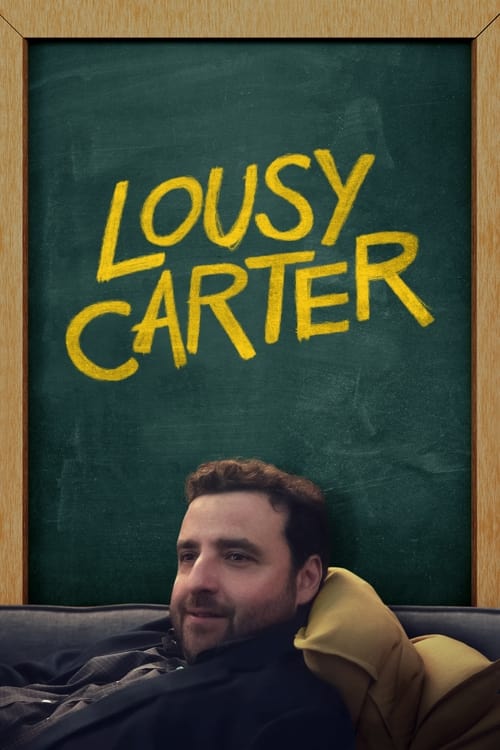Lousy Carter – Film Review
Published March 30, 2024

Lousy Carter, written and directed by the somewhat polarizing yet intriguing indie cinema’s Bob Byington, emerges as a quirky attempt to delve into the comedy genre with a premise ripe with potential for both heart and hilarity. This film features a cast led by David Krumholtz, whose character-driven portrayal aims to infuse life into Carter, a man stamped as a societal and familial disappointment. Alongside him, notable performances from Olivia Thirlby, Martin Starr, Stephen Root, and Jocelyn DeBoer add layers to this tale of existential dread and comedic despair. Despite the ingredients for a breakout hit, Lousy Carter ultimately delivers a mixed bag that dances awkwardly on the line between genius and gimmick.
At its core, Lousy Carter endeavors to craft a narrative about redemption, dreams, and the unlikely relationships that propel individuals to confront their deepest fears. Krumholtz’s Carter is a man besieged by his shortcomings, both in his professional life as a high school teacher and within his personal life, marred by the disparaging views of his ex and his mother. This foundation is relatable, presenting a universal struggle against the tide of expectations and self-doubt. However, the execution falters, veering too often into the realm of the implausible without the grounding needed to foster genuine connection.
The chemistry among the cast, particularly between Krumholtz and Thirlby, who plays Candela, a beacon of hope in Carter’s otherwise dismal existence, shines as a highlight. Thirlby delivers her role with a nuanced balance of earnestness and wit, elevating the scenes she inhabits. Meanwhile, Martin Starr’s Kaminsky and Stephen Root’s Analyst offer moments of comedic brilliance that occasionally remind the viewer of Byington’s capability for insightful humor. Jocelyn DeBoer, as Olivia Kaminsky, rounds out the core with a performance that both compliments and contrasts the absurdity of the central journey.
One of the film’s most glaring issues is its inconsistency in tone. Byington seems undecided whether to fully embrace the absurdity of Carter’s situation or to anchor the story in a more relatable reality. This indecisiveness creates a jarring experience that often pulls the viewer out of the narrative, undermining the film’s potential for emotional impact. At times, Lousy Carter feels like a series of disconnected vignettes, each with its own promise but lacking in cohesive narrative drive.
The film’s visual style and direction, while competent, do little to elevate the material. Byington’s choice of a somewhat muted palette ostensibly aims to mirror Carter’s drab outlook on life, but this choice also unfortunately mutes the vibrancy that comedy thrives on. There are moments where the direction shines, particularly in scenes that embrace the more surreal aspects of Carter’s journey, but these are too few and far between to form a consistent visual identity.
Where Lousy Carter does find solid footing is in its sporadic moments of genuine humor and insight. The script, though uneven, provides enough sharp dialogue and situational comedy to keep the viewer engaged. It’s in these moments that we see the potential of what could have been, had the film found a more stable narrative and tonal ground to stand on. Byington’s wit is evident, and when it connects, it serves as a poignant reminder of the human condition and the absurdity of our collective anxieties.
Moreover, the thematic exploration of existential dread and the pursuit of unfulfilled dreams resonates, albeit inconsistently. There’s an underlying commentary on the modern condition — the societal and internal pressures that define our sense of self-worth and success. Byington touches on these themes with varying degrees of success, offering glimpses into a deeper, more reflective film that could have been more impactful with a tighter narrative focus.
Ultimately, Lousy Carter is a film that tantalizes with its premise and occasionally delivers on its promise of a unique comedic experience. However, it’s bogged down by its inconsistency in tone, direction, and narrative cohesion. Krumholtz’s performance, alongside the supporting cast, stands as a testament to the potential greatness that could have been achieved with a more disciplined approach to storytelling and thematic exploration.
For fans of indie comedies and those seeking a film that straddles the line between existential reflection and quirky humor, Lousy Carter offers enough to warrant a viewing. However, for those looking for a more polished, coherent cinematic journey, the film may prove to be a frustrating experience. In the end, Lousy Carter embodies the very essence of its protagonist: a project with dreams and aspirations that, despite earnest effort, falls just short of its intended mark.
